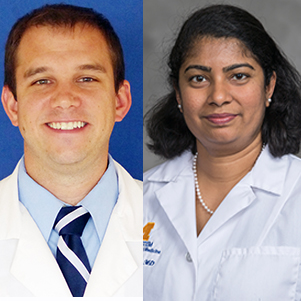Two more Michigan Medicine physician-scientists have been designated as Taubman Emerging Scholars, the university’s Taubman Institute announced.
The five-year, $200,000 Emerging Scholar grants are intended to accelerate the work of faculty members who run research laboratories in addition to caring for patients.
“Physician-investigators fill a vitally important role in the development of new medical discovery and treatments,” said Taubman Institute Director Charles F. Burant, MD, PhD. “Financial assistance and mentoring at this crucial early-career moment will help our most promising clinician-scientists succeed. In turn, their new insights into the causes and treatment of disease will provide hope for patients with challenging conditions.”
The new Emerging Scholars are:
Brian Emmer, MD, PhD. Dr. Emmer is an assistant professor of internal medicine who cares for patients as a hospitalist. His research studies focus on the human genome, and his current project seeks to target ACE2, the receptor in human cells that interacts with COVID-19’s spike protein.
Already, Dr. Emmer has tested all 20,000 genes in the human genome to identify 32 novel regulators of ACE2. His proposed work seeks to clarify the pathways that control ACE2 expression at a molecular level. Understanding this process may reveal why some patients with COVID-19 get only mild symptoms while others become critically ill and die. This project may also identify vulnerabilities of the virus which could then be exploited for pharmaceutical development.
“I am deeply grateful and honored to be selected as a Taubman Scholar,” said Dr. Emmer. “This award will be crucial in supporting the growth of my lab as we investigate the functional genomics of COVID-19. We want to understand which human genes influence SARS-CoV-2 infection, with the goal of translating this knowledge into the development of new treatments.”
Anna Mathew, MD. Dr. Mathew is a Michigan Medicine nephrologist and assistant professor at the U-M medical school, who treats patients of all ages for an array of kidney diseases. She also is a researcher whose current project explores the role of activated immune cells in the development of heart disease in kidney patients.
Dr. Mathew’s laboratory seeks to determine why patients with kidney disease have as much as 15 to 30 times higher risk of heart disease than patients of the same age with normal kidney function. She suspects metabolic pathways in immune cells are altered in kidney disease, leading to plaque formation in blood vessels and heart disease.
Her lab explores altered amino acid -tryptophan metabolism and its contribution to inflammation and progression of atherosclerotic disease in kidney patients. The altered tryptophan pathway demonstrates tremendous translational potential in clinical studies as a biomarker to predict incident cardiovascular disease in chronic kidney disease patients.
“Support from the Taubman Institute will help generate critical insights into the risk factors and mechanisms behind the exaggerated heart disease risk in kidney patients,” she said. “Deciphering these mechanisms will open up avenues to create drugs, identify lifestyle changes, and improve our dialysis or transplantation modalities to help kidney patients have a longer, more disease-free life.”
Since 2011, the Taubman Institute has appointed 35 Emerging Scholars, in fields ranging from ophthalmology to depression to ovarian cancer. The program was created by the late founder of the institute, A. Alfred Taubman, to nurture the next generation of medical scientists. In addition to financial support, Emerging Scholars join a community of mid-career and senior scholars for collaboration, coaching and other support.






